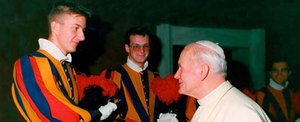John Paul II was exemplary CEO, says former bodyguard turned social entrepreneur
Published: September 21, 2011 / Author: Ed Cohen

On Christmas Eve in 1986, Pope John Paul II stepped out of his residence in the Palace of the Vatican on his way to celebrate Christmas Mass. As usual, there was a Swiss Guard stationed outside his door. The pope hadn’t seen the man before, so he asked if he was new.
It turned out he was. The guard, who stood 6-foot-9, introduced himself.
The pope then took a closer look at the man’s face. The guard’s eyes were red from crying.
“Oh, this is your first time being away from home on Christmas, isn’t it?” the pope asked, and with that the fears began flowing down the big man’s face once again. The Holy Father embraced him.
The pope’s former guard, Andreas Widmer of Switzerland, related that story Tuesday night to students in an entrepreneurship course, Entrepreneurial Insights, at the University of Notre Dame’s Mendoza College of Business. Now an internationally known entrepreneur, philanthropist and advocate for economic-development solutions to poverty, he said he wanted students to remember the story when they became business leaders.
Widmer said he was so sad and homesick that night because Christmas Eve is a huge celebration in his part of Europe and especially within his family. The youngest of six children, he came from a Swiss village of 400 people. He was 20 years old, had never been away from home on the holiday, and had just spoken with his mother in Switzerland by phone. She could only weep at the news that he was going to have to work that night. The posting outside the pope’s residence was one of his first in the Guard.
Widmer said the pope was, in effect, the CEO of his organization, the leader of a billion Catholics, and he, Widmer, was lower than the person who cleans the offices. Yet this CEO not only noticed him but would get to know everything about him, the other guards, and everyone else in the Vatican, he said.
“He knew what my longings were, he knew about me. He knew me,” said Widmer, “and that model of how to run a company is something I want you to remember.”
Widmer is the co-founder of the SEVEN (Social Equity VENture) Fund, a philanthropic organization of entrepreneurs that co-sponsors the competitive Pioneers of Prosperity Awards for small- to medium-size enterprises in emerging markets. Companies that demonstrate the ability to scale up can receive up to $100,000 to invest in technical infrastructure and training, and to connect with networks of people with technical expertise, potential investors and other entrepreneurs.
In a talk that was as much faith testimony as management advice, Widmer said his conversations with the pope and later experiences in business taught him the importance of “servant leadership.” Widmer’s new book, The Pope & The CEO, offers leadership lessons he gained while serving as a Swiss Guard from 1986-88 and in his later life as an executive and entrepreneur in the high-tech world.
After college, Widmer said he worked for companies that pioneered Internet technologies. He talked about personally experiencing the financial boom and eventual bust in the industry’s early years along with camaraderie and betrayal by his colleagues. His negative experiences led him to question traditional business practices and beliefs.
He said the teachings of John Paul II convinced him that investment and entrepreneurship – which he calls “an act of co-creation” with God – are worthwhile pursuits for business and the keys to improving life for people living in poverty.
Widmer said John Paul II defined poverty not in monetary terms, such as living on less than a dollar a day, but as being excluded from the “network of productivity and exchange.” Poor countries, he believed, need business, not just charity, and business needs investors.
Poverty-stricken Africa exemplifies the phenomenon, Widmer said. The continent accounts for 12 percent of the world’s population and receives 29 percent of all gift aid, but just 1.4 percent of foreign direct investment, he said.
“Ask your parents, ask yourself how much of your investment is in Africa,” he said.
Africa already has thousands of tiny ventures supported by microfinance loans, and some multinational corporations have operations on the continent, he said. Small and medium-sized home-grown enterprises with the potential for growth, he said, represent the “missing middle.”
A member of the advisory board for Notre Dame’s Gigot Center for Entrepreneurial Studies, Widmer is also a Research Fellow in Entrepreneurship at the Acton Institute and an adviser to the Zermatt Summit, an annual business leadership event that strives to humanize globalization. He serves as an adviser to Transforming Business, a research and development project at the University of Cambridge, and is a member of many advisory boards and boards of directors. He blogs regularly at www.faithandprosperity.com.
Entrepreneurial Insights is a fall lecture series that features a entrepreneurs, investors, innovators and business leaders who offer their experience and advice in areas critical to the creation of new ventures, the ongoing viability of existing business, economic growth and the betterment of society. For more information about the series or the Gigot Center for Entrepreneurial Studies, visit http://business.nd.edu/gigot_center/
/news_and_events/news_articles/article/10054/john-paul-ii-was-exemplary-ceo-says-former-bodyguard-turned-social-entrepreneur




